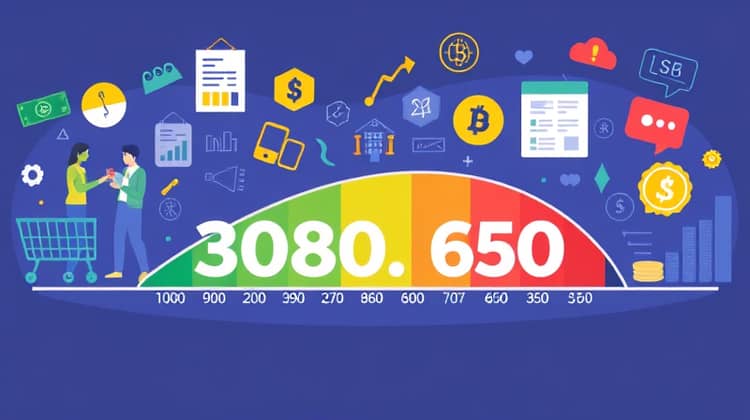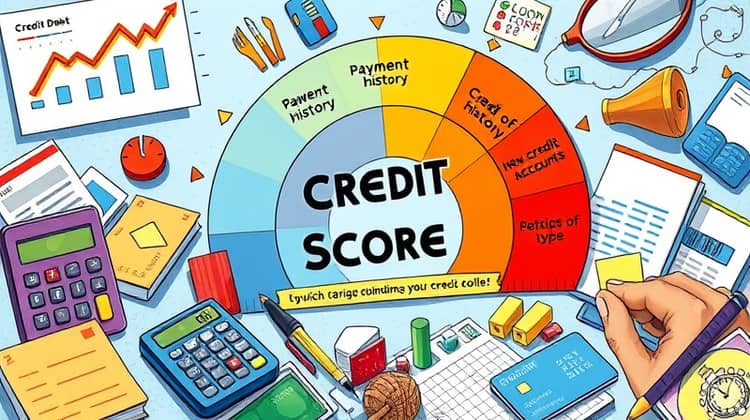Credit Score Secrets: 7 Factors You Must Understand

In today’s financial world, a good credit score is essential for securing loans, obtaining credit cards, and even getting a favorable interest rate. Understanding the factors that influence your credit score can pave the way toward better financial decisions and long-term stability. This article will delve into the seven crucial factors that you must understand to maintain and improve your credit score, helping you unlock financial opportunities.
Many consumers are often left in the dark regarding their credit scores, leading to a cycle of misunderstanding and financial mishaps. However, by gaining knowledge about the intricacies of credit scoring, you can take control of your financial health. Remember, your credit score is not just a number; it reflects your creditworthiness and financial behavior over time.
Let’s dive deeper into what a credit score is, its importance, and the various aspects that contribute to its calculation.
What is a Credit Score?

A credit score is a numerical representation of a person's creditworthiness, typically ranging from 300 to 850. It is calculated based on information from the individual's credit report, which includes their borrowing and repayment history. Financial institutions use this score to assess the risk of lending money or extending credit to an individual.
Credit scores are derived from various factors, including payment history, credit utilization, length of credit history, types of credit accounts, and recent credit inquiries. Higher credit scores typically suggest a past pattern of responsible financial behavior, while lower scores indicate a higher risk to lenders.
Understanding what constitutes a credit score is crucial for consumers, as it directly affects their ability to obtain loans and establish credit. Many people do not realize that their credit score can impact more than just loans—it's also a significant factor for landlords, insurance companies, and even employers.
In essence, a credit score is a vital tool that reflects how well you manage your finances, making it important to be mindful of the factors influencing it.
Why is Your Credit Score Important?

A good credit score is critical for multiple reasons. When you apply for credit, lenders will check your score to determine the risk of defaulting on a loan. A higher score often leads to lower interest rates, saving you money in the long run.
Having a stable credit score can also play a significant role in your ability to rent an apartment or even get certain job offers. Employers and landlords often check credit scores as a part of their vetting process, as it can be an indication of responsibility and integrity.
In short, your credit score is a comprehensive evaluation of your financial health. Ignoring or misunderstanding its complexities can limit your financial opportunities and lead to unnecessary stress.
How is Your Credit Score Calculated?

Calculating a credit score involves analyzing several key factors that reflect your credit behavior. Every scoring model may weigh these factors differently, but the general components remain consistent.
- Payment History
- Credit Utilization
- Length of Credit History
- New Credit Accounts
- Types of Credit in Use
- Total Debt
- Inquiries
Each of these aspects contributes uniquely to your final score, showcasing your financial habits and risk profile. Understanding these factors can empower you to make better choices regarding your credit.
1. Payment History

One of the most significant factors affecting your credit score is your payment history. This aspect considers whether you have paid your bills on time and the frequency of late payments. Consistent on-time payments demonstrate reliability to lenders and contribute positively to your score.
Late payments, defaults, and bankruptcies can severely hurt your credit score. The more recent the payment issue, the more weight it holds in calculating your score. Therefore, maintaining a spotless payment record should be a top priority for everyone seeking to improve their credit.
Being proactive about your payments involves setting reminders, automating bills, or even discussing terms with creditors if financial difficulties arise.
2. Credit Utilization

Credit utilization refers to the ratio of your current credit card balances to your total credit limits. Keeping this ratio low is essential for maintaining a strong credit score.
A good rule of thumb is to aim for a utilization ratio below 30%. Higher utilization rates suggest to lenders that you may be overextending yourself financially, possibly leading to payment issues in the future.
- Keep track of spending on credit cards
- Try to pay off your balance in full each month
- Request increases on credit limits to improve utilization ratio
Remember, responsible use of credit means balancing spending and repayments, which will ultimately benefit your score.
3. Length of Credit History

The length of your credit history accounts for how long your credit accounts have been active. The longer your history, the more reliable you appear to lenders since they can observe your financial behavior over time.
Opening new accounts can lower the average age of your credit history, which may temporarily impact your score negatively. Therefore, it's generally beneficial to keep older accounts open, even if you're not using them regularly.
- Keep old credit accounts open
- Avoid opening multiple new accounts at once
- Monitor your credit report for accuracy
A well-established credit history can show lenders that you are a stable borrower, enhancing your appeal when applying for new credit.
4. New Credit

When you apply for new credit, lenders will perform a hard inquiry on your credit report, which can temporarily lower your score. Numerous credit inquiries in a short period can signal that you're in financial distress, potentially making you a riskier borrower.
It's essential to be strategic about applying for new accounts. Limiting applications and spreading them out over time can help minimize the impact of inquiries on your score.
Therefore, making informed decisions about when and how often to apply for new credit is crucial for maintaining a healthy score.
5. Credit Mix

Credit mix refers to the variety of credit accounts you hold, such as credit cards, mortgages, and installment loans. A diverse credit portfolio can positively influence your score, as it shows lenders you can responsibly manage different types of credit.
While having a mixed credit file can be beneficial, it's vital not to take on debt solely for the sake of improving your credit mix. It’s better to focus on responsibly managing the credit you already have.
Creditors prefer borrowers who demonstrate a diversified credit history, but managing that credit responsibly is what matters most.
6. Debt Amount

The total amount of debt you carry is another critical factor influencing your credit score. High levels of debt, regardless of on-time payments, can negatively affect your score because it indicates potential financial strain.
Ideal debt levels vary by individual, but maintaining a manageable balance relative to your income can prevent adverse effects on your credit. Being actionable about repayment plans and keeping debts within limits is the key to financial stability.
Striking a balance between leveraging credit for purchases and managing debt levels is essential for strong credit health.
7. Hard and Soft Inquiries

Two types of inquiries affect your credit score: hard inquiries and soft inquiries. A hard inquiry occurs when you apply for new credit, while a soft inquiry happens when a company checks your credit for promotional purposes or you check it yourself.
Understanding the difference between these two inquiries is vital, as hard inquiries can impact your score.
- A hard inquiry can stay on your report for up to two years.
- Soft inquiries do not affect your credit score at all.
- Multiple hard inquiries within a short time can signal risk to lenders.
Monitoring your inquiries and being mindful of new credit applications can help maintain a healthy credit score.
Tips to Improve Your Credit Score

Improving your credit score requires strategic actions. By understanding the factors that influence your score, you can make informed decisions to enhance your financial standing.
- Pay your bills on time, consistently.
- Keep your credit utilization low, ideally under 30%.
- Limit new credit applications to avoid hard inquiries.
Implementing these strategies can gradually but significantly improve your credit score, making you a more attractive candidate for loans and credit.
Understanding Different Credit Score Models

There are several credit scoring models available, including FICO and VantageScore, each with its unique scoring system and weight for factors. Understanding these models can provide clarity on how your score may differ when evaluated by different lenders.
FICO is the most commonly used scoring model, accounting for factors like payment history, credit utilization, length of credit history, and types of credit. On the other hand, VantageScore places more emphasis on recent credit behavior and may have a different scoring range.
Different lenders might use different scoring models, which can cause variations in your credit score from one institution to another. Hence, it is crucial to monitor your score through diverse platforms to get a holistic view of your credit health.
Conclusion

In today’s credit-driven world, your credit score acts as a financial report card, influencing virtually every monetary decision you’ll make. Understanding the various factors that affect your score empowers you to take charge of your financial destiny.
Keeping a positive credit score requires diligence, responsibility, and awareness of your credit habits. By implementing the strategies outlined in this article, you can work toward building and maintaining a strong financial foundation.






